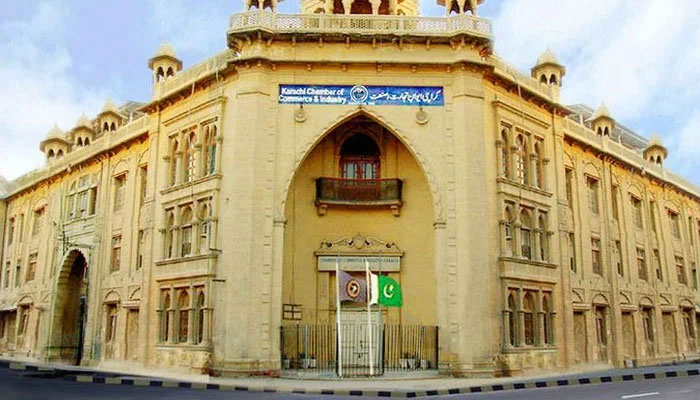KCCI pushes for interest rate cut as inflation falls
KARACHI: President of the Karachi Chamber of Commerce & Industry (KCCI), Muhammad Jawed Bilwani, has called on the State Bank of Pakistan to cut the policy rate by 300 to 500 basis points (bps) in the upcoming monetary policy committee (MPC) meeting, citing a sharp drop in inflation to 6.9 per cent in September 2024.
In a statement, Bilwani acknowledged the State Bank’s recent efforts to reduce the policy rate from 22 per cent to 17.5 per cent over the past three meetings. He highlighted that the September inflation figures marked the second consecutive month of single-digit inflation after more than two years of high inflation, suggesting that now is the time for a more substantial rate cut.
“With inflation under control and commodity prices stabilising, a significant rate cut of 300 to 500 basis points is essential to ease the burden on businesses and stimulate economic growth,” Bilwani said. He noted that lower interest rates would boost large-scale manufacturing, which has experienced sustained declines in recent months. “In October 2021, when inflation was at 9.2 per cent, the policy rate was 7.2 per cent. Now, with inflation even lower, our call to reduce the rate to single digits is justified,” he added.
Bilwani emphasised the challenges faced by the private sector due to high interest rates, citing a 19.2 per cent drop in the Large-Scale Manufacturing Index (LSMI) from January to July 2024. He also pointed out that collateral requirements for loans in Pakistan average 153 per cent of the loan value, according to the World Bank, often exceeding the amount borrowed and further limiting access to finance.
Referring to World Bank data, Bilwani explained that private-sector credit in Pakistan is among the lowest in emerging markets, accounting for only 12 per cent of GDP in 2023. In comparison, private-sector credit is 50.1 per cent of GDP in India, 50.3 per cent in Turkey, and 37.6 per cent in Bangladesh. He noted that government borrowing absorbs 79.7 per cent of total credit, effectively crowding out the private sector. By September 2024, the private sector’s share in total credit had declined to 20.3 per cent, down from 29 per cent in March 2022. In Bangladesh, by contrast, only 22.4 per cent of total credit is used by the public sector, enabling their private sector to thrive.
Bilwani concluded by stating that while the State Bank has successfully controlled inflation, its stringent monetary policy has created an imbalanced credit environment that threatens long-term growth. He also warned that the government’s reliance on domestic borrowing to finance fiscal deficits at high interest rates has pushed domestic debt servicing costs to unsustainable levels. The markup on domestic debt rose by 50.4 per cent, from Rs4.8 trillion to Rs7.2 trillion in FY24, largely due to elevated policy rates.
-
 Costco $20 Rule Explained As Employee Pay Climbs Across North America
Costco $20 Rule Explained As Employee Pay Climbs Across North America -
 Strange Incident Happened At Nancy Guthrie's Home On Abduction's 10th Day
Strange Incident Happened At Nancy Guthrie's Home On Abduction's 10th Day -
 Tumbler Ridge School Lockdown Underway As RCMP Investigate School Shooting
Tumbler Ridge School Lockdown Underway As RCMP Investigate School Shooting -
 Britney Spears Quietly Parts Ways With Her Music Catalog: Report
Britney Spears Quietly Parts Ways With Her Music Catalog: Report -
 Princess Diana Bodyguard Suspected ‘she Could Die’: Here’s How
Princess Diana Bodyguard Suspected ‘she Could Die’: Here’s How -
 King Charles Makes It ‘absolutely Clear’ He Wants To Solve Royal Crisis
King Charles Makes It ‘absolutely Clear’ He Wants To Solve Royal Crisis -
 Royal Family Warned To ‘have Answers’ Amid Weak Standing
Royal Family Warned To ‘have Answers’ Amid Weak Standing -
 Marc Anthony On Why Bad Bunny’s Super Bowl Show Mattered
Marc Anthony On Why Bad Bunny’s Super Bowl Show Mattered -
 Kid Rock Gets Honest About Bad Bunny’s Performance At Super Bowl
Kid Rock Gets Honest About Bad Bunny’s Performance At Super Bowl -
 Kylie Jenner Reveals Real Story Behind Her 'The Moment' Casting
Kylie Jenner Reveals Real Story Behind Her 'The Moment' Casting -
 Jaafar Jackson Breaks Silence On Becoming Michael Jackson
Jaafar Jackson Breaks Silence On Becoming Michael Jackson -
 Eva Mendes Reveals One Costar She Envied Ryan Gosling Over
Eva Mendes Reveals One Costar She Envied Ryan Gosling Over -
 Halsey Marks Fiancé Avan Jogia's Birthday With Emotional Note
Halsey Marks Fiancé Avan Jogia's Birthday With Emotional Note -
 China: Stunning Drone Show Lights Up Night Sky Ahead Of Spring Festival 2026
China: Stunning Drone Show Lights Up Night Sky Ahead Of Spring Festival 2026 -
 Andrew's Epstein Scandal: Will King Charles Abdicate Following King Edward's Footsteps?
Andrew's Epstein Scandal: Will King Charles Abdicate Following King Edward's Footsteps? -
 Billy Joel Leaves Loved Ones Worried With His 'dangerous' Comeback
Billy Joel Leaves Loved Ones Worried With His 'dangerous' Comeback




